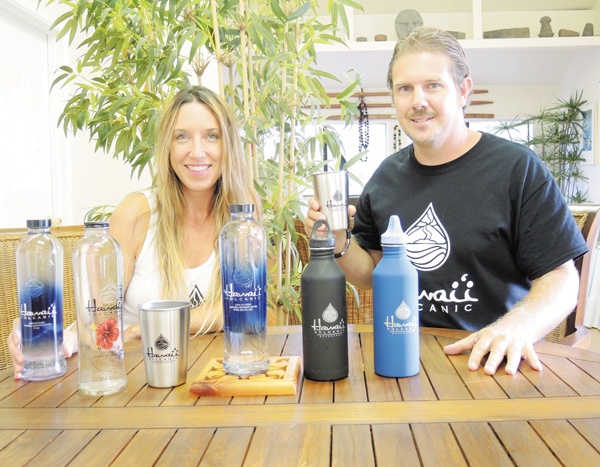LIHUE — Hawaii Volcanic Beverages intends to make a splash in the exclusive world of luxury artesian waters by offering a local alternative and glass bottles. The Big Island bottler and distributor opened in June 2012, but recently started commercial
LIHUE — Hawaii Volcanic Beverages intends to make a splash in the exclusive world of luxury artesian waters by offering a local alternative and glass bottles.
The Big Island bottler and distributor opened in June 2012, but recently started commercial operations with the goal to capture 20 percent of the 1.5 million residents and eight million visitors annually.
The company is owned by Princeville residents Jason and Channon Donovan. They are labeling their company as Ka Wai Ola (water for life) to reflect its eco-friendly and humanitarian goals with wavesforwater.org, a nonprofit that partners with travelers to bring water filtration systems to communities around the world.
“We have a big sense of pride in Hawaii water and we want to bring it to the people of Hawaii and the world,” said Channon Donovan.
The idea for Hawaii Volcanic Beverages began when the former plastic bottled water manufacturer, Aloha Pure just outside of Hilo in Keaau, closed in 2008 with the crash of the economy.
However, Aloha Pure had already completed the six-year process of getting approval for commercial use of permitted wells. They built a plant and underwent three years of drilling applications, hydrology studies and getting approval from Food and Drug Administration and Department of Health officials.
The ability to acquire a lava filtered natural artesian well without having to go through the same process made the project costs feasible, Donovan said. He moved into the 15,000-square-foot facility and switched out the plastic bottling machinery to bottle glass.
Hawaii is feeling the effects of the world’s overuse of plastics as it floats onto island shores.
They considered biodegradable bottles but glass was the best solution for the tropical climate, Donovan said.
The glass product line is smaller, more efficient and uses less energy, he said. They are running on about one-third renewable energy and plan to increase that percentage by adding more solar and installing a bio-diesel generator.
“It is real important to us as environmentalists with a child to be natural capitalists,” Donovan said.
To compete directly with plastic bottled water, he wanted to make the more expensive glass something that people would admire. Only the finest liquor manufacturers give as much attention to beautiful but affordable detail, he said.
The super flint glass bottle has embossed island logos and silver and white raised fonts over a blue translucent fade. People will pay $4 a bottle for the keepsake alone, he said.
“It’s as good as it gets,” Donovan said. “The goal was to make a bottle that you don’t want to throw away.”
The potential clients include hotels, gift stores, restaurants and taverns that carry attractive and collectable bottles. They are also reusable water bottles for locals.
Distribution to all the islands is crucial to growth and the company entered an exclusive agreement with Paradise Beverages. They will introduce and deliver the product to any of their 3,000 clientele on all islands who choose to carry it along with picking up the returnable bottles.
Paradise Beverages President Paul Ahcook said his company works with several bottled water distributors. Local producers of natural spring water offer a sustainable alternative to help reduce the carbon footprint that comes from importing purified bottled water across the ocean, he said.
“My recommendation to Jason was to get into the high-end glass bottle business,” Ahcook said.
“I think Jason and his wife are great people and that they can fill a niche that has been lacking in the Hawaii bottled water industry.”
The plant is situated between 14,000-foot Mauna Kea and Mauna Loa mountains, with runoff recharging the watershed with 1.38 billion gallons a day.
A water plant does not pose a danger to the largest Big Island aquifer, he said.
“It is a drop in the bucket,” he said. “We are taking one-half of 1 percent coming out of the ground over there.”
The water travels through nutrient rich volcanic rock with life essential minerals such as silica, magnesium, potassium and calcium, according to the company. It has a naturally occurring average alkaline pH level of 7.8, high enough to help reduce acidity in the body and provide proper hydration.
The only technology required prior to bottling is to run the fresh water through micron filters and ultraviolet lights to remove any particulates, algae or bacteria.
“It is a long and challenging road for water companies,” Donovan said. “They get the snake eye from people who say water should be free — but it’s not free to create a product.”
The difference between natural water and purified water is that water purification companies step into any location in the world and run tap water through reverse osmosis to remove everything — the toxins but also the natural minerals — and then re-inject the minerals to make it palatable.
Natural water comes out of the ground with no contaminants, he added. It already tastes good and is healthy without having to run it through membranes.
Once they perfect the product lines and operations, the company plans to market to North America and Asia. They also plan to introduce essence waters, exotic island fruit infused teas, energy drinks and other ultra-premium beverages.
Donovan spends about one-third of his time at the Hilo plant and said they have developed strong personal and working relationships on the Big Island. Their ohana network is rooted on Kauai, however.
“We can never see ourselves leaving here,” he said.


